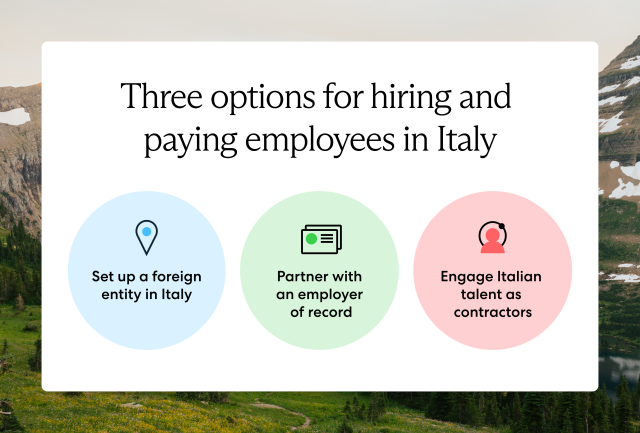Italian culture is known for its focus on quality, creativity, and ingenuity, all desirable traits in any industry. Plus, the Italian workforce is bilingual and well-educated, serving as a valuable resource for global employers.
Italian talent can bring a wealth of knowledge, inspiration, and perspective to any team. Still, hiring employees in Italy comes with unique challenges, from navigating collective bargaining agreements to clarifying corporate tax liabilities.
Fortunately, engaging talent in this market doesn’t have to be complicated. This guide covers everything you need to know about hiring employees in Italy, from calculating total employee cost to mitigating risk. Plus, find out how to engage talent in Italy without establishing a legal entity.
How do I hire an employee in Italy?
Global companies can hire employees in Italy by establishing a legal entity, hiring Italian contractors, or partnering with an employer of record (EOR). Each approach involves unique advantages and disadvantages, ranging from flexibility and cost savings to risk mitigation. The best approach for any business depends on its individual expansion goals.
Hiring employees in Italy: 3 options for global employers
As previously mentioned, global companies have three options for hiring employees in Italy: establishing a legal Italian business entity, hiring Italian contractors, or partnering with an employer of record (EOR).
We discuss each approach in detail below.

Set up a legal entity
The traditional approach to hiring employees in Italy involves setting up a legal business entity in Italy. This option makes sense for companies planning to hire a large local team and eyeing a long-term presence in the Italian market.
With a legal entity, you can reduce long-term hiring costs by directly hiring local talent and maintaining control over the entire employment process, from hiring and onboarding to running global payroll.
However, this approach leaves you responsible for navigating local employment and tax regulations on your own, exposing you to major compliance risks.
Plus, entity establishment is time-consuming, costly, and often more trouble than it’s worth. Establishing a legal business entity in Italy involves significant upfront investments, including accounting, licensing, and registration fees. Minimum share capital can reach over €50,000, depending on the entity type.
This approach also delays your time to market, as you usually have to wait months before you can legally engage local talent.
If you’re looking for a faster, more flexible, and budget-friendly approach to hiring employees in Italy, consider hiring contractors or partnering with an EOR instead.
Engage contractors in Italy
Engaging international contractors offers global companies a streamlined and flexible approach to quickly engaging talent overseas. This approach comes with many benefits, ranging from flexibility and cost savings to lower commitments.
By hiring Italian contractors, foreign employers can source local talent with specialized skills for short-term projects while saving time and resources they would otherwise invest in hiring, onboarding, paying, and supporting a team of full-time employees. This option also requires no investments in local infrastructure.
Still, hiring contractors involves significant disadvantages. Without a cohesive, committed team of full-time employees, businesses often struggle to maintain steady growth as they expand their international footprint.
Plus, federal employment regulations in Italy strictly regulate contractor-client relationships, creating a serious misclassification risk for foreign employers unfamiliar with the local law.
Any influence on your contractor’s work schedule, work attire, or payment schedule can easily amount to an employment relationship and subject your company to fines and other penalties. We discuss misclassification risk in greater detail later on.
While hiring contractors offers unique benefits, this approach only makes sense for employers who are comfortable navigating complex foreign employment regulations on their own and value flexibility over establishing long-term growth potential.
Read more: Should You Hire an Employee or a Contractor?
Partner with an employer of record (EOR)
The most straightforward approach to hiring employees in Italy is to partner with a global expansion expert, such as an EOR.
An EOR is a third-party entity with global infrastructure and international legal expertise that eliminates the complexities of hiring talent across borders. By partnering with an EOR, you can hire employees worldwide without establishing legal entities or worrying about complying with local employment regulations along the way.
With global scale, in-country expertise, and a range of global workforce management solutions, an EOR streamlines every aspect of international hiring. This includes hiring, onboarding, immigration, compliance, running global payroll, administering global benefits, and offering ongoing HR support to your team on your behalf.
An EOR serves as an ideal solution for testing the waters of a foreign market before making long-term investments or engaging local talent while undergoing lengthy incorporation procedures.
By partnering with an Italian EOR, you can quickly and compliantly hire employees in Italy while remaining flexible, agile, and on budget.
Learn more: What Is an Employer of Record (EOR)?
How much does it cost to hire an employee in Italy?
The cost of hiring an employee in Italy is roughly 33-40% of an employee’s base salary due to mandatory employer contributions to social security, pension, and severance. Still, total employee cost in Italy varies widely based on factors like the number of employees hired, occupation, and income.
Employers must also pay their Italian employees 13-month and 14-month salaries, each of which equals 8.33% of their employee’s base salary.
Interested in hiring employees in Italy? Use our employee cost calculator below to get reliable insights into employee costs and payroll contributions in Italy:
Employment laws to know before hiring employees in Italy
Understanding local employment regulations is critical for your success as you build an Italian workforce.
Global companies operating in this market must familiarize themselves with federal and local statutes, including Collective Bargaining Agreements (CBAs), payroll standards, income tax rates, and social security contributions.
We discuss each of these in detail below.
Collective bargaining agreements in Italy
Collective bargaining agreements (CBAs) are employment regulations that trade unions and employer associations agree upon that supplement federal and local laws.
CBAs regulate about 80% of all industries across Italy and usually apply industry-wide, impacting all employers and employees within a sector. These provisions influence specific areas of the law, such as severance pay and working hours, while providing general guidelines for others.
Take minimum wage, for instance. Since there is no federally regulated minimum wage in Italy, CBAs establish minimum wages for most industries, creating variances between sectors.
Other aspects of Italian labor law that CBAs regulate include the following:
- Ensuring pay rises with prices, accounting for expected inflation
- Regulating changes to company processes, such as new work methods
- Regulating non-pay issues, such as holidays, hours, leave, and information rights
Any foreign company operating in the Italian market must familiarize itself with all relevant CBA provisions in its industry. Penalties range from fines and employee backpay to legal injunctions and limited business opportunities, depending on the violation.
Or, consider partnering with a third-party legal expert, such as an EOR, to ensure compliance on your behalf.
Payroll in Italy
Payroll in Italy is relatively straightforward, although it differs slightly from other European countries.
Below, we list the key aspects of Italian payroll that all companies operating in this market should know:
- Payroll cycle. The payroll cycle in Italy is monthly. Employers must pay wages by the 27th of each month.
- Minimum wage. There is no statutory minimum wage at the national or regional level. CBAs establish minimum wages across most industries in Italy.
- 13th and 14th-month salary. While bonuses aren’t mandatory, most employees expect a 13th-month and 14th-month salary each year—one during the summer holidays and one at Christmas. CBA provisions often require at least one.
- Severance pay. Employers must pay severance (trattamento di fine rapporto or TFR) in all termination cases, including resignation or dismissal for just cause. The TFR contribution rate is 6.91% of employee gross monthly earnings.
Remember, payroll terms in Italy vary between industries and CBA provisions.
Tax rates and social security contributions in Italy
Familiarizing yourself with Italian income tax rates and statutory payroll contributions is critical for ensuring compliance when paying and managing an international workforce.
Below, we outline Italy’s income tax brackets and statutory contribution rates for state-backed insurance programs.
Income tax
Employers in Italy must withhold national, regional, and municipal level income taxes from employee salaries.
National income tax rates are progressive, meaning higher income levels incur higher tax rates. National income tax brackets for fiscal year 2024 are as follows:
| Taxable income | Tax rate |
|---|---|
| €0 - €28,000 | 23% |
| €28,001 - €50,000 | 35% |
| €50,000 and over | 43% |
Regional and municipal income tax rates vary between locales. Regional rates typically range from 1.23% to 3.33%, while municipal rates are between 0% and 0.9%.
Statutory contributions
Employers must also make statutory payroll contributions and withholdings with each monthly payroll cycle. Social security, or the Instituto Nazionale Previdenza Sociale (INPS), comprises the bulk of these contributions.
INPS rates vary depending on company activity, the number of employees, and the employee’s role; however, employer contributions are usually around 30%, while employees contribute roughly 10%.
Employers and employees pay into INPS up to a €119,650 per-employee cap, after which employers must make minimal contributions of around 5%.
Roughly 33% of total INPS contributions support the national pension scheme, while the rest goes to other funds, including the following:
- Old age
- Survivor and disability
- Civil invalidity
- Unemployment
- Redundancy
- Maternity indemnity
- Sickness indemnity
- Family allowance
Employers must also withhold 6.91% of employee monthly earnings for TFR. TFR funds become available to employees when they resign, or their employer terminates their employment.
Remember, all businesses operating in Italy must report annual employee wages, taxes, and social security contributions to the Italian Revenue Agency by filing a Certificazione Unica (CU) and issuing copies of CUs to all employees.
Leave entitlements in Italy
All employees in Italy receive the following leave entitlements:
- Annual leave. Employees receive a minimum of four weeks’ paid annual leave. CBAs and individual contracts may stipulate additional paid or unpaid leave.
- Parental leave. Pregnant employees receive five months of maternity leave at 80% pay, while fathers receive seven days at 100% pay. CBA provisions may stipulate longer leave periods and greater pay.
- Illness and injury. Employees receive 180 days of sick leave at 100% pay for the first three days, 50% from the 4 to the 20 day, and 67% from the 21 to the 180 day.
- National and regional holidays. In addition to paid annual leave, employees in Italy also enjoy 12 annual paid public holidays.
Compliance risks when hiring employees in Italy
Familiarizing yourself with Italian employment law is critical for mitigating risk as you build a distributed team in this country. Still, some regulatory nuances pose a unique risk to foreign employers, requiring extra due diligence.
For instance, satisfying all federal employment and tax laws isn’t enough to ensure regulatory compliance. Foreign employers must also navigate Italy’s complex CBA provisions to clarify which agreements apply in their sector. Plus, some laws evolve, such as worker classification statutes, requiring ongoing audits to avoid penalties.
Key challenges employers face in this market include misclassification, payroll contributions, permanent establishment, and immigration requirements.
We discuss each of these in detail below and offer tips for mitigating risk.
Misclassification
Worker classification refers to how you designate talent according to local regulations—as employees or contractors. While classification may seem straightforward, Italian regulations are complex, leaving ample room for interpretation and posing a serious risk for foreign employers unfamiliar with the local law.
Employees in Italy enjoy various employment rights, such as minimum wage protections, leave entitlements, and overtime limits. While contractors don’t enjoy the same protections, they maintain other freedoms—they can establish their work schedule, choose their work attire, and subcontract projects to other contractors.
If an employer encroaches on any of these freedoms, they risk establishing an employment relationship with their contractor. For instance, setting up ongoing regular payments with a contractor can amount to an employment relationship and subject your organization to fines, back pay, benefits arrears, and reputational damage.
Remember, classifying talent once at the beginning of your working relationship isn’t enough. As work dynamics change and classification regulations evolve, employers can find themselves non-compliant at any time.
If you choose to hire contractors in Italy, consider seeking counsel from a local third-party legal expert with experience in Italian employment law to ensure ongoing compliance.
Read more in our complete guide to employee misclassification.
Incorrect payroll contributions
Navigating foreign payroll and tax regulations is one of the most difficult aspects of managing an international workforce. Incorrect payroll contributions in Italy result in fines and operational delays, and it can strain your relationship with your team. Some due diligence can help you avoid major setbacks.
As previously mentioned, total payroll contributions and withholdings in Italy comprise social security and severance payments, amounting to roughly 33% to 40% of an employee’s gross monthly earnings.
Before entering the Italian market, enlist an experienced HR team and provide them with the necessary tools to run compliant global payroll. Making timely and accurate payments to your Italian team is critical for avoiding workflow disruptions, financial loss, and employee churn.
Or, consider partnering with a global payroll partner to handle Italian payroll on your behalf. Partnering with a payroll partner, such as an EOR, is a particularly wise move if you are considering further expansion into other markets.
Permanent establishment
Any time a business operates overseas in any capacity, it risks creating a permanent establishment (PE) in its target market and subjecting itself to local corporate taxation.
While PE regulations vary worldwide, most countries stipulate that any foreign business conducting revenue-generating activities from a fixed location in the country is a PE and must comply with local corporate tax regulations.
In Italy, if a foreign organization meets any of the following criteria, it is a PE:
- The company owns a physical office in Italy
- The company carries out strategic decisions and day-to-day management from a physical location in Italy
- An Italian tax resident has direct or indirect ownership of the company
- The company’s board of directors consists primarily of Italian residents
Depending on how you manage your Italian team and approach your local operations, you may trigger PE status in Italy. Clarifying your corporate tax obligation as you build a team in the country is critical for avoiding back taxes, fines, and other penalties.
Simplify hiring employees in Italy with Velocity Global
Navigating Italy’s complex labor regulations may feel overwhelming, but the right partner can make a world of difference. Quickly and compliantly hire employees in Italy with Velocity Global.
Our EOR solution makes it easy for global companies to hire talent in over 185 countries, including Italy, without establishing legal entities or worrying about violating local employment laws.
We simplify global hiring and workforce management by handling everything from hiring, onboarding, immigration, and compliance to running global payroll, administering global benefits, and offering ongoing HR support to your team in their local language.
Lean on us to handle the heavy lifting so you can source top Italian talent and build your dream team in Italy with ease.
Contact us today to get started.
Topic:
Country Guides



